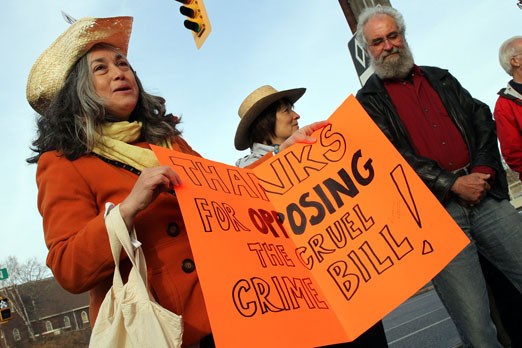A dozen or so protestors donned cowboy hats on Thursday and took to the streets, up in arms about the Conservative government’s omnibus crime bill.
The hats, they said, were to show solidarity with Texas Republicans, who have repeatedly told government officials that a heavy-handed approach to crime and punishment is bound to fail.
Gwen O’Reilly, who leads the Thunder Bay Women’s Court Watch program, in conjunction with the Faye Peterson Transition House, says the public needs to understand that the 110-page bill, also known as the Safe Streets and Communities Act, makes criminals out of the wrong people.
Being poor or working in the sex-trade industry should not be the basis to send someone to jail, O’Reilly said, concerned for the marginalized portion of the community who will be facing longer prison terms and less chance at rehabilitation because of the punishing nature of the legislation.
“Those are people who don’t necessarily belong in the criminal justice system in the first place, and they’re the ones who are going to face the largest punishment,” O’Reilly said. “And of course, we see this in the courts every day, that people with fewer resource, people of whom society have a low opinion, receive the highest sanctions.”
Miriam Ketonen considers it a waste of billions of taxpayer dollars, especially given the failure in states like Texas, where tough-on-crime legislation placated the conservative base, but was fiscally unsustainable and had little impact on crime rates.
“It’s a waste of money, as well as all the other difficulties it’s going to cause,” Ketonen said.
Sally Palmer Woods of the Elizabeth Frye Society said her fear is the bill will actually create more crime in the long run.
There are fewer chances for people to rehabilitate under Prime Minister Stephen Harper’s plan, which includes mandatory minimums for drug, sex, violent and other serious offences, tougher drug penalties and for violent and repeat young offenders.
The legislation, first tabled on Sept. 21, is also expected to include an end to sentencing discounts for time served and give police heightened surveillance freedom using the Internet.
“People will be in jail longer without any help for rehabilitation, and when they get out, they’ll fall back in the same cycle. We really need more money spent helping them get back on their feet, sort of prevention type of things,” Palmer Woods said.
“People get acclimatized to living in institutions and it’s very hard for them when they get out. So they’re more likely to get back in again.
Robin Faye helped organize the local Stand Against the Crime Bill demonstration, held outside the constituency offices of Thunder Bay MP Bruce Hyer (NDP, Thunder Bay-Superior North), coinciding with 120 or so other protests staged across the country on Thursday.
Faye said she cares about what happens in her community and said she sees people depressed and angry every day. There are deep social issues that need to be addressed in Thunder Bay, and putting people in jail isn’t the answer.
“It will be impossible to make the community safe by doing that kind of cruel system. What we need to do is address the root causes of poverty and we need to do it yesterday,” Faye said.
The government is expected to be presented with a petition signed by 24,000 Canadians opposing Bill C-10, along with the Canadian Bar Association’s 10-point criticism of the legislation.
Speaking last month, MP Greg Rickford (Cons., Kenora) said the public has already had its say and are in favour of harsher punishments.
Canadians have said this is what they want, and stiffening penalties for child pornography, increasing penalties for organized drug-crime activity, ending house arrests for the most serious of crimes, protecting the public from violent young offenders and eliminating pardons for serious crimes are just a few of the things this bill will do Rickford said.
Plus it will help victims of crimes, who along with children are the most vulnerable, he added.
